The legend at 57: Kamal Haasan
The versatile and talented Kamal Haasan turns 55. On his birthday we take a look back at the superstar's illustrious journey.
-
 To any film fan, Kamal Haasan needs no introduction. The multi-talented actor, screenwriter and director is considered to be one of the leading method actors of Indian cinema.
To any film fan, Kamal Haasan needs no introduction. The multi-talented actor, screenwriter and director is considered to be one of the leading method actors of Indian cinema.
Over his five decade and running career, he has carved a very special place for himself in the minds and hearts of the audience with his versatility and grace.
As the legendary actor turns 57, we take a look at his illustrious journey in pictures... -
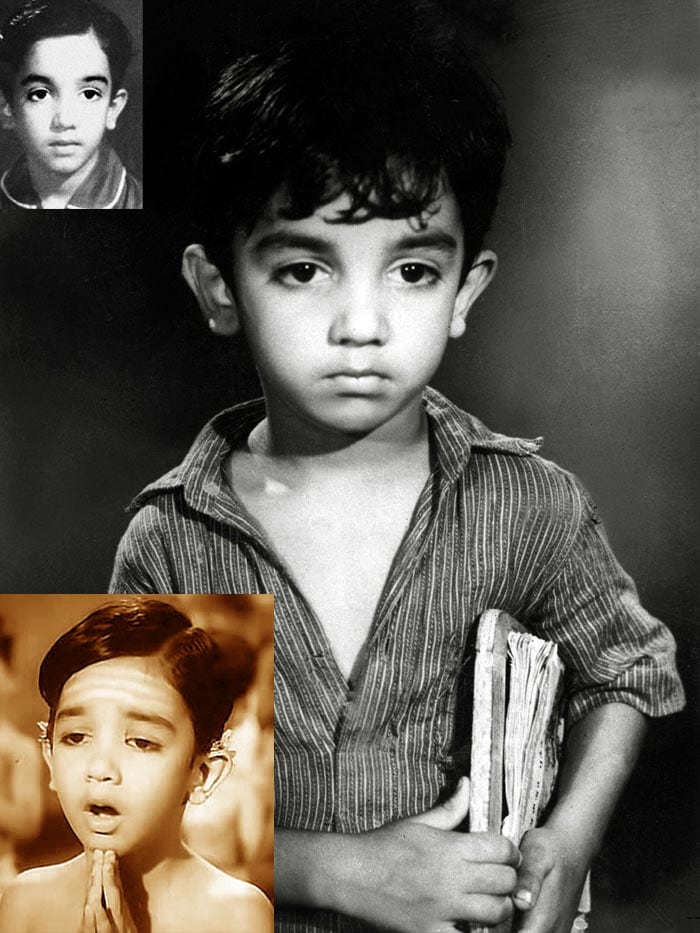 Kamal Haasan was born on November 7, 1954 to a Tamil Iyengar family in Paramakudi town in Ramanathapuram district of Tamil Nadu.
Kamal Haasan was born on November 7, 1954 to a Tamil Iyengar family in Paramakudi town in Ramanathapuram district of Tamil Nadu.
Kamal Haasan made his film debut as a four-year-old child artiste, in the film Kalathur Kannamma, which was released on August 12, 1959, directed by A Bhimsingh.
He was cast along with the veteran Tamil actor Gemini Ganesan in the film, which won him the National Film Award for Best Child Artist. -
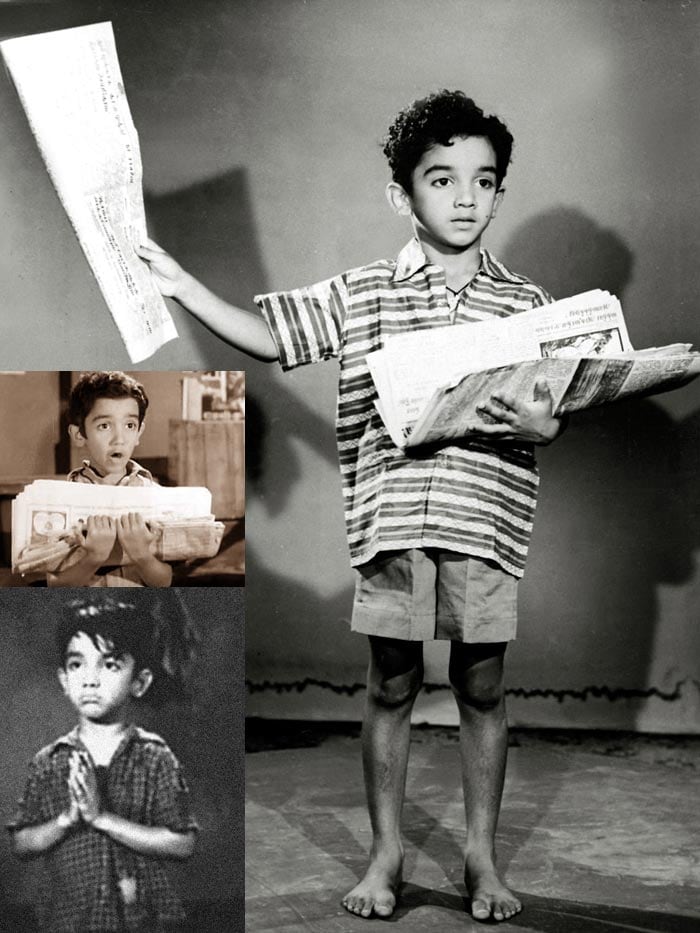 As a child actor, he acted in five other Tamil films in the subsequent years - Paarthal Pasi Theerum, Paadha Kannikkai, Kannum Karalum, Vaanampadi, Anandha Jodhi - with stalwarts Sivaji Ganesan and MG Ramachandran.
As a child actor, he acted in five other Tamil films in the subsequent years - Paarthal Pasi Theerum, Paadha Kannikkai, Kannum Karalum, Vaanampadi, Anandha Jodhi - with stalwarts Sivaji Ganesan and MG Ramachandran. -
 This was followed by a seven-year hiatus from films. Kamal chose to concentrate on his education as well as master karate and Bharatanatyam in this time.
This was followed by a seven-year hiatus from films. Kamal chose to concentrate on his education as well as master karate and Bharatanatyam in this time.
He returned in 1970, even if for a dance sequence in Maanavan. This was followed by small roles in films like Nootrukku Nooru, Annai Velankanni, Kurathi Magan, Kanna Nalama.
Haasan earned his first major role in the 1973 film Arangetram, followed by Sollathaan Ninaikkiren, in which he played the role of a villain. Incidentally, both films starred Sivakumar.
His final supporting role before establishing himself as a lead actor was in Naan Avanillai (1974). -
 He received first of his four Filmfare awards for the the Malayalam film Kanyakumari (1974). In the next four years, he won six regional Best Actor Filmfare Awards, including four consecutive Best Tamil Actor Awards.
He received first of his four Filmfare awards for the the Malayalam film Kanyakumari (1974). In the next four years, he won six regional Best Actor Filmfare Awards, including four consecutive Best Tamil Actor Awards.
His performance K Balachander's Apoorva Raagangal (1975), a film on of age-gap relationships, won him a Filmfare Award for Best Actor (Tamil) award. -
 The late 1970s was a period that saw Kamal Haasan frequently collaborate with K Balachander, who also cast him in many of his socially-themed films such as Avargal (1977).
The late 1970s was a period that saw Kamal Haasan frequently collaborate with K Balachander, who also cast him in many of his socially-themed films such as Avargal (1977). -
 In 1976, Haasan appeared in the drama Moondru Mudichu with Rajinikanth and Sridevi, another K Balachander film, Manmadha Leelai, and Oru Oodhappu Kan Simittugiradhu, which won him his second consecutive Filmfare Best Actor Award (Tamil).
In 1976, Haasan appeared in the drama Moondru Mudichu with Rajinikanth and Sridevi, another K Balachander film, Manmadha Leelai, and Oru Oodhappu Kan Simittugiradhu, which won him his second consecutive Filmfare Best Actor Award (Tamil). -
 The film 16 Vayathinile won him his third consecutive award. He played the role of a mentally ill villager in the film starring alongside Rajinikanth and Sridevi.
The film 16 Vayathinile won him his third consecutive award. He played the role of a mentally ill villager in the film starring alongside Rajinikanth and Sridevi. -
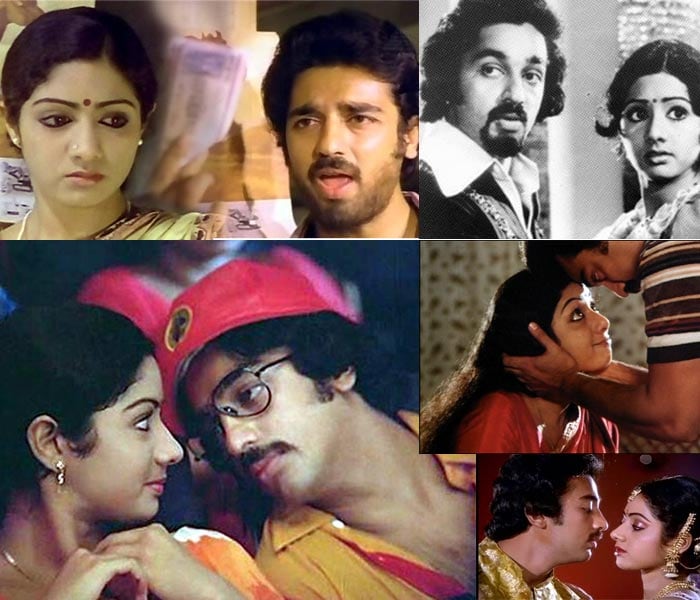 Kamal Haasan earned his fourth consecutive Filmfare award for Sigappu Rojakkal in 1978.
Kamal Haasan earned his fourth consecutive Filmfare award for Sigappu Rojakkal in 1978.
He played the role of a psychopathic sexual killer in the film, which was a stark contrast from the roles he had played earlier.
In the late seventies, Haasan appeared in other films such as Ninaithale Inikkum (1979) and the horror film, Neeya.
Kamal Haasan's pairing with actress Sridevi was very successful at the time. The duo's first project together was the less-known film Kuttavum Sikshayum (1977). The pair continued to work together in films like Thaayillamal Naan Illai (1979), Guru, Neela Malargal, Kalyanaraman and Varumayin Niram Sigappu, all in 1980. -
 Kamal Haasan also made guest-cameo appearances in films like Thillu Mullu.
Kamal Haasan also made guest-cameo appearances in films like Thillu Mullu.
Rajinikanth had previously appeared in some of Kamal Haasan's previous films.
Haasan's 100th career film appearance was in the 1981 film Raja Paarvai, which also marked his debut in film production.
Despite this film's relatively poor reception at the cinemas, his portrayal of a blind session violinist earned him a Filmfare Award. -
 With Ek Duuje Ke Liye (1981), Kamal Haasan made his Bollywood debut and what a stellar one at that.
With Ek Duuje Ke Liye (1981), Kamal Haasan made his Bollywood debut and what a stellar one at that.
The film was a remake of his Telugu film, Maro Charithra (1978) by K Balachandar and earned Kamal a nomination for the Filmfare Best Actor Award. -
 Haasan won his first of three National Awards for Best Actor with his portrayal of a school teacher who looks after a mentally retarded girl in Balu Mahendra's Moondram Pirai (1982); he reprised his character for the Hindi remake of the film Sadma (1983).
Haasan won his first of three National Awards for Best Actor with his portrayal of a school teacher who looks after a mentally retarded girl in Balu Mahendra's Moondram Pirai (1982); he reprised his character for the Hindi remake of the film Sadma (1983).
In 1983, Haasan also appeared in Thoongathey Thambi Thoongathey playing a double role. -
 During 1984-85, Haasan began to appear in more and more Bollywood films, including Saagar (1985), for which he won both the Filmfare Best Actor Award and the Best Supporting Actor Award, making him the first actor to win both awards for a single film.
During 1984-85, Haasan began to appear in more and more Bollywood films, including Saagar (1985), for which he won both the Filmfare Best Actor Award and the Best Supporting Actor Award, making him the first actor to win both awards for a single film.
Saagar saw him share screespace alongisde Rishi Kapoor. Dimple Kapadia played the love interest of both the actors in the film.
That year, he also appeared in the Hindi film Geraftaar alongside Amitabh Bachchan. -
 He featured in Tamil cinema's first sequel Japanil Kalyanaraman, which followed up his previous, Kalyanaraman as well as acting in Uruvangal Maralam co-starring Sivaji Ganesan and Rajinikanth.
He featured in Tamil cinema's first sequel Japanil Kalyanaraman, which followed up his previous, Kalyanaraman as well as acting in Uruvangal Maralam co-starring Sivaji Ganesan and Rajinikanth. -
 In the mid-1980s, Haasan appeared in two Telugu films, Sagara Sangamam and Swathi Muthyam with director, Kasinadhuni Viswanath.
In the mid-1980s, Haasan appeared in two Telugu films, Sagara Sangamam and Swathi Muthyam with director, Kasinadhuni Viswanath.
Swathi Muthyam was the first and only Telugu movie till date which was submitted to the Oscars in 1986.
Whilst, the former film portrayed Haasan as a drunkard classical dancer, Swathi Muthyam saw him play the role of an autistic person attempting to change the society. -
 This was followed by Punnagai Mannan (1986), in which he played a double role and Vetri Vizha (1989), in which he played a man suffering from amnesia.
This was followed by Punnagai Mannan (1986), in which he played a double role and Vetri Vizha (1989), in which he played a man suffering from amnesia.
In 1987, Haasan appeared in Mani Ratnam's Nayagan, a film in which he essayed the role of an underworld don in Mumbai.
Playing a real-life underworld don, Haasan's portrayal evoked mass sympathy towards the struggle of South Indians living in Mumbai.
He received a National Award for his performance in Nayagan, which was India's official entry for the Best Foreign Language Film for the Academy Awards in 1987.
The film was also dubbed into Hindi (as Velu Nayakan) and Telugu (as Nayakudu).
The film was also included in the TIME Magazine's All-Time 100 Greatest Movies list . -
 In 1987, Haasan appeared in his only silent film to date; appearing in the black comedy, Pushpak.
In 1987, Haasan appeared in his only silent film to date; appearing in the black comedy, Pushpak.
In 1989, Haasan played a triple role in Apoorva Sagodharargal.
The commercial film portrayed him in a role as a dwarf. He then attempted dual roles in the Telugu film Indrudu Chandrudu and its Tamil remake.
Kamal Haasan won the Filmfare Award for Best Actor(Telugu) in 1989. -
 In 1990, Michael Madhana Kama Rajan saw Haasan go one step further, acting in four different roles as quadruplets.
In 1990, Michael Madhana Kama Rajan saw Haasan go one step further, acting in four different roles as quadruplets.
The film started an ongoing collaboration for comedy films between Haasan and Crazy Mohan, an actor and dialogue writer.
Haasan won successive best actor awards for his portrayal of the protagonist in Guna and in Thevar Magan, where he played the son of actor Sivaji Ganesan. -
 After films such as Singaravelan, Maharasan and Kalaignan; Haasan began to appear in comedies such as Sathi Leelavathi, based on the English film She-Devil, as well as renewing his collobaration with Kasinadhuni Viswanath in his last Telugu language film till date, Subha Sankalpam.
After films such as Singaravelan, Maharasan and Kalaignan; Haasan began to appear in comedies such as Sathi Leelavathi, based on the English film She-Devil, as well as renewing his collobaration with Kasinadhuni Viswanath in his last Telugu language film till date, Subha Sankalpam. -
 In 1996, Haasan starred in the police story, Kuruthipunal.
In 1996, Haasan starred in the police story, Kuruthipunal.
His success in Kuruthipunal was followed by his third National Film Award for Best Actor in Indian.
Playing dual roles of a freedom fighter and his corrupt son, the film also won Haasan regional awards and plaudits for his portrayal. -
 Haasan appeared as a woman in Avvai Shanmughi inspired by the Hollywood production, Mrs Doubtfire.
Haasan appeared as a woman in Avvai Shanmughi inspired by the Hollywood production, Mrs Doubtfire.
He soon made his debut as director with a remake of Avvai Shanmughi in Hindi titled Chachi 420. -
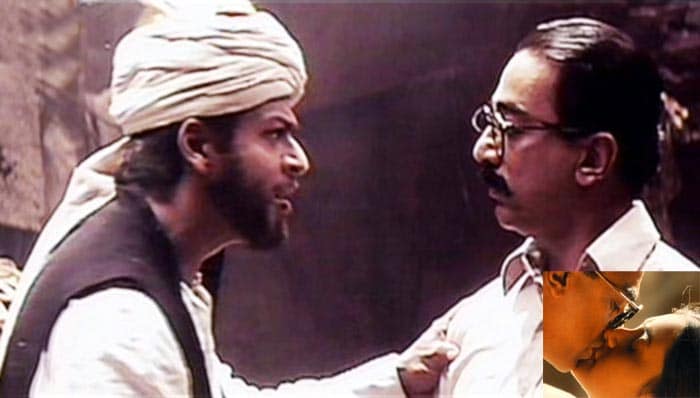 Following a two-year hiatus, Haasan filmed his second directorial venture, Hey Ram, a period drama told in flashback with a semi-fictional plot centering around India's Partition and the assassination of Mahatma Gandhi.
Following a two-year hiatus, Haasan filmed his second directorial venture, Hey Ram, a period drama told in flashback with a semi-fictional plot centering around India's Partition and the assassination of Mahatma Gandhi.
Haasan also took on roles as the writer, the lyricist and the choreographer as well as producing the film under his home banner.
The film, also featured Shah Rukh Khan and Rani Mukherjee and was India's submission for the Academy Awards in 2000. -
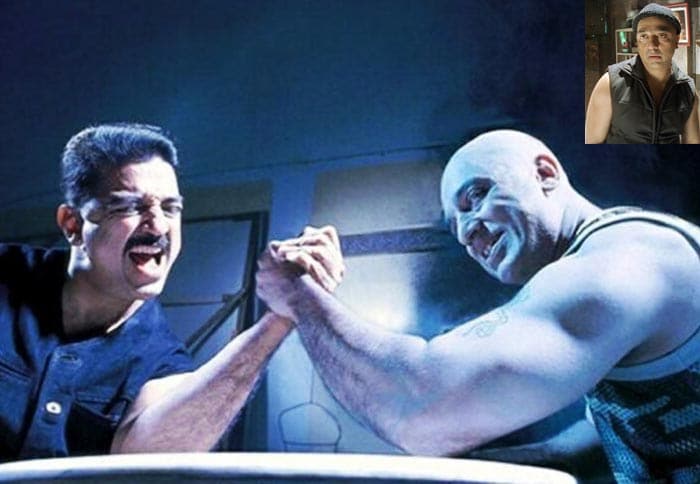 His following film was Aalavandhan, where he portrayed two distinct roles, for one of which he had his head tonsured and gained as many as 10 kgs.
His following film was Aalavandhan, where he portrayed two distinct roles, for one of which he had his head tonsured and gained as many as 10 kgs.
Despite much publicity prior to release, the film failed commercially.
Kamal Haasan opted to repay distributors who had suffered losses due to the film. -
 Following a series of successful comedies in Thenali, Panchathantiram and Pammal K Sambandam and a couple of guest appearances, Haasan directed his third feature film in Virumandi, a film about the death penalty.
Following a series of successful comedies in Thenali, Panchathantiram and Pammal K Sambandam and a couple of guest appearances, Haasan directed his third feature film in Virumandi, a film about the death penalty. -
 Haasan also appeared in Anbe Sivam alongside Madhavan. Priyadarshan, who started the film, departed allowing director Sundar C to complete the film. Anbe Sivam told the story of Nallasivam, enacted by Haasan as an idealist, social activist and communist.
Haasan also appeared in Anbe Sivam alongside Madhavan. Priyadarshan, who started the film, departed allowing director Sundar C to complete the film. Anbe Sivam told the story of Nallasivam, enacted by Haasan as an idealist, social activist and communist. -
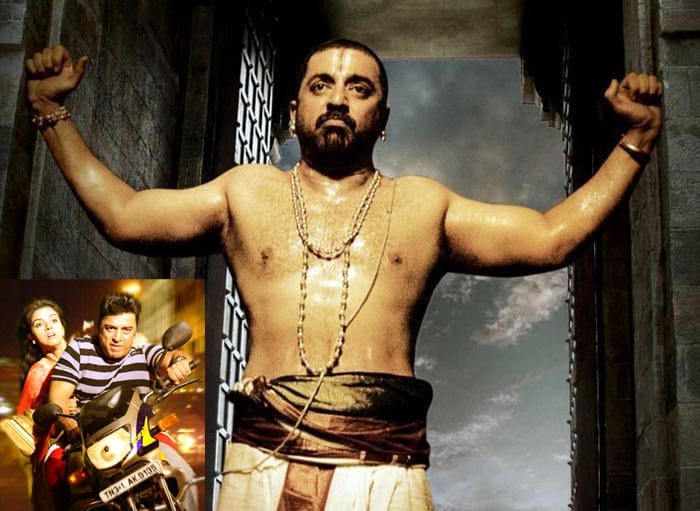 Haasan appeared in KS Ravikumar's Dasavathaaram portraying 10 distinct roles in the venture, which is one of the most expensive Indian films ever made.
Haasan appeared in KS Ravikumar's Dasavathaaram portraying 10 distinct roles in the venture, which is one of the most expensive Indian films ever made.
Dasavathaaram (2008) became the second highest grossing film ever in the history of Tamil cinema and won Haasan critical praise for his enactment.
He was also the story and screenwriter for the project.
He was paired opposite Asin Thottumkal in the film. -
 Following the completion of Dasavathaaram, Haasan opted to direct his fourth directorial venture, with a film tentatively titled Marmayogi, which after a year of pre-production became stalled.
Following the completion of Dasavathaaram, Haasan opted to direct his fourth directorial venture, with a film tentatively titled Marmayogi, which after a year of pre-production became stalled.
He then opted to produce and star in a venture, Unnaipol Oruvan, co-starring him with Mohanlal. -
 Kamal Haasan has won four National Film Awards for his performances in Kalathur Kannamma, Moondram Pirai, Nayagan and Indian.
Kamal Haasan has won four National Film Awards for his performances in Kalathur Kannamma, Moondram Pirai, Nayagan and Indian.
He has also tried his hand at playback singing and has sung for more than 50 films in his career. -
 Despite gaining much acclaim in his film career, Kamal Haasan's personal life has been full of setbacks, and he has been in the news as much for his work as for his on and off relationships.
Despite gaining much acclaim in his film career, Kamal Haasan's personal life has been full of setbacks, and he has been in the news as much for his work as for his on and off relationships.
Early in his career, he co-starred in several Tamil and Malayalam films with noted actress Srividya. The pair were reported to have been a part of a notorious affair in the 1970s. -
 Srividya, who died in 2006, was visited by Haasan at her bedside during her final days.
Srividya, who died in 2006, was visited by Haasan at her bedside during her final days.
Haasan and Srividya's relationship was explored in the 2008 Malayalam film, Thirakkatha by Renjith, with Anoop Menon portraying the character of Kamal Haasan and Priyamani playing Srividya. -
 In 1978, at the age of 24, Haasan met and married danseuse Vani Ganapathy, who was elder to him.
In 1978, at the age of 24, Haasan met and married danseuse Vani Ganapathy, who was elder to him.
Vani designed the costumes for her husband's films and grabbed eyeballs for walking along with Haasan into the Filmfare Awards South ceremony of 1980, immediately after their wedding. -
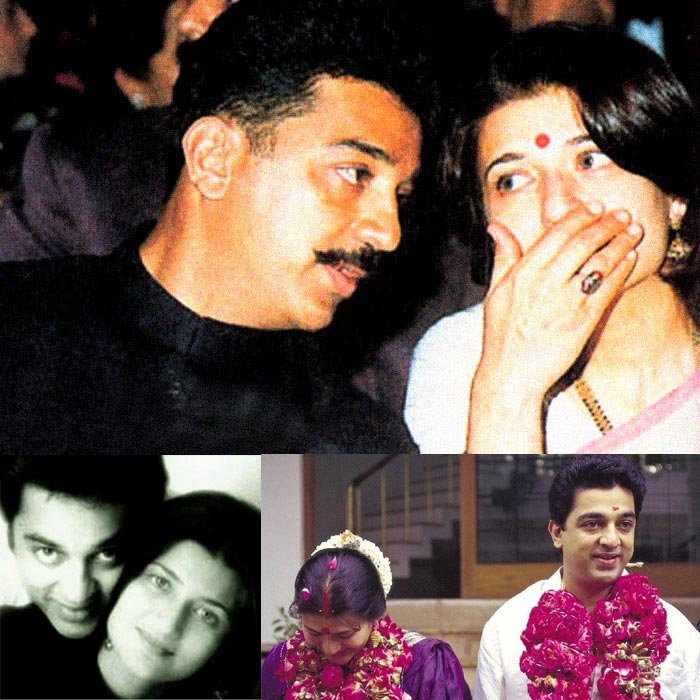 Kamal Haasan and Vani Ganapathy split after 10 years of togetherness. The reason later emerged to be the actor's relationship with fellow actress, Sarika.
Kamal Haasan and Vani Ganapathy split after 10 years of togetherness. The reason later emerged to be the actor's relationship with fellow actress, Sarika.
Subsequently, Haasan and Sarika married in 1988. The duo have two children - Shruti Haasan (born 1986) and Akshara Haasan (born 1991). -
 While Shruti is a singer and actress, making her debut in Luck, Akshara is pursuing higher studies in Bangalore.
While Shruti is a singer and actress, making her debut in Luck, Akshara is pursuing higher studies in Bangalore.
Inset: Akshara Haasan. -
 Sarika, retired from acting roles soon after her marriage with Haasan, replacing his ex-wife, Vani Ganapathy as Haasan's costume designer.
Sarika, retired from acting roles soon after her marriage with Haasan, replacing his ex-wife, Vani Ganapathy as Haasan's costume designer. -
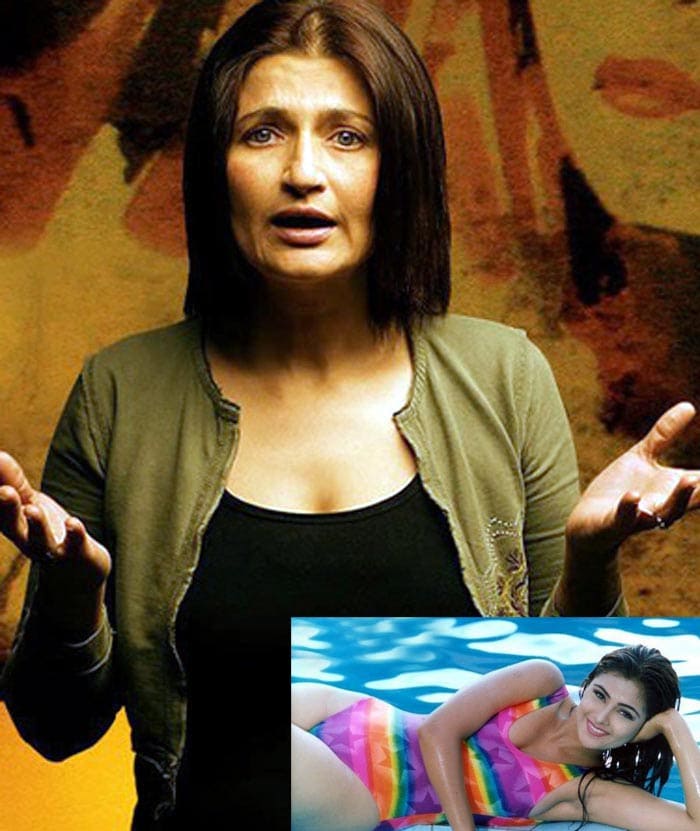 Haasan and Sarika filed for divorced in 2002, with Sarika estranging herself from her children as well as Haasan by the end of the year 2004.
Haasan and Sarika filed for divorced in 2002, with Sarika estranging herself from her children as well as Haasan by the end of the year 2004.
Haasan's intimate relationship with co-star Simran Bagga, who is 22 years younger to him, became the reason for the divorce. -
 A brief relationship with Simran, who appeared opposite Haasan in two consecutive ventures with Pammal K Sambandam and Panchathantiram, followed after she ended her relationship with choreographer Raju Sundaram.
A brief relationship with Simran, who appeared opposite Haasan in two consecutive ventures with Pammal K Sambandam and Panchathantiram, followed after she ended her relationship with choreographer Raju Sundaram.
However, the pair's companionship was shortlived, as Simran went on to marry a childhood friend in 2004. -
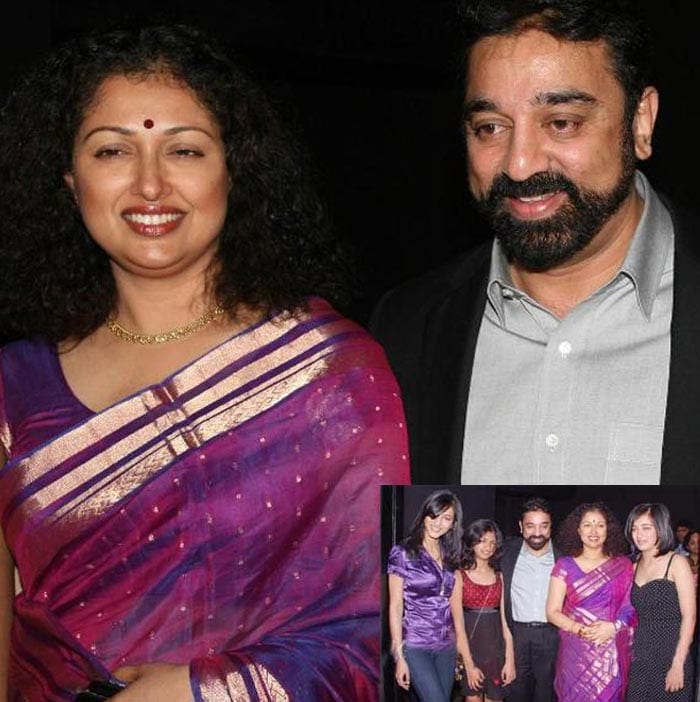 Currently Haasan lives with former actress, Gouthami Tadimalla, who co-starred with Haasan in several films in the late 1980s to the early 1990s.
Currently Haasan lives with former actress, Gouthami Tadimalla, who co-starred with Haasan in several films in the late 1980s to the early 1990s.
Inset: Kamal with Gouthami (centre), her daughter Subhalakshmi (left), and his daughters Akshara and Shruti. -
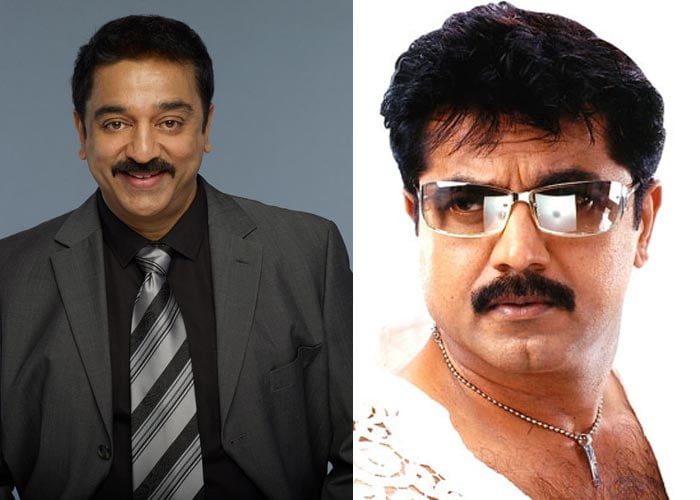 Kamal Haasan had announced a couple of months ago that he will play a role in the remake of the Malayalam film. But with the commencement of Viswaroopam, it is said that Kamal has too much on his plate.
Kamal Haasan had announced a couple of months ago that he will play a role in the remake of the Malayalam film. But with the commencement of Viswaroopam, it is said that Kamal has too much on his plate.
The Tamil version of the Malayalam flick Traffic, a film based on a real incident that took place in Chennai, was in the news as Kamal Haasan was said to be eyeing a pivotal role in the film.
However, director Rajesh Pillai confirms that it is actor Sarath Kumar who has been signed up for another role in the same film.
The Tamil version is in the pre-production stage and filming is expected to begin only by February next year. Meanwhile, the Bollywood version is scheduled to take off by mid-November with Sunny Deol in the lead. -
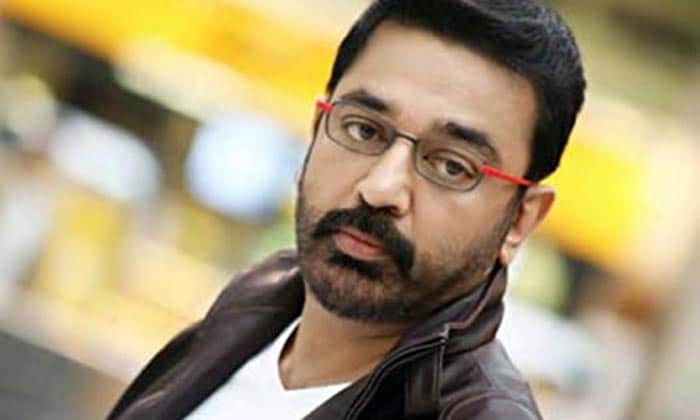 2010 saw Kamal in Manmadhan Ambu besides playing a cameo in Four Friends.
2010 saw Kamal in Manmadhan Ambu besides playing a cameo in Four Friends.
Advertisement
Advertisement
Advertisement
Advertisement